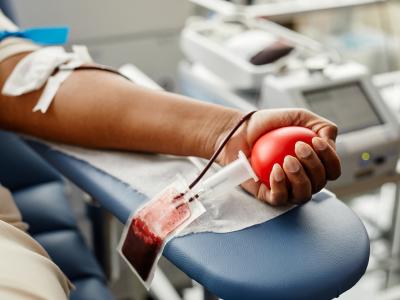Ebola sickens 3 more in the DRC; new case reported in Butembo
Three more Ebola cases have been confirmed in the Democratic Republic of the Congo (DRC), raising the outbreak total to 3,354 cases, according to numbers reflected on the World Health Organization (WHO) online Ebola dashboard.
Health officials are still investigating 488 suspected cases. Also, 3 more people died from their infections, lifting the fatality count to 2,220.
Yesterday the DRC's Ebola technical committee (CMRE) said one of the two cases reported on Dec 17 involved a person from Butembo, marking the first case in the former hot spot in 54 days. The patient is a 23-year-old woman from Mabalako, one of the current outbreak epicenters. She was listed as a known contact of an earlier case-patient but had not been located for vaccination.
The woman's symptoms began on Dec 11, and she traveled to Butembo to visit her sister on Dec 15, where she was seen that day at an outpatient clinic. After some initial reluctance, she was taken to the city's Ebola treatment center. Nineteen of the woman's contacts have been recorded, including 10 of her family members. Responders carried out ring vaccination in Butembo on Dec 17, with a similar campaign planned tomorrow for her contacts in Mabalako.
The other patient noted in the CMRE report was from Mabalako, one of the current outbreak epicenters.
WHO Ebola dashboard
Dec 18 CMRE report
Hard-boiled egg linked Listeria outbreak sickens people in 5 states
The US Centers for Disease Control and Prevention (CDC) announced yesterday that it and state health partners are investigating a Listeria monocytogenes outbreak that has sickened seven people, one of them fatally, in five states and appears to be linked to bulk hard-boiled eggs produced by a Georgia company.
The eggs from Almark Foods, based in Gainesville, were packaged in plastic pails and distributed nationwide for use by food service operators. The products haven't been recalled, but the CDC warns against selling, serving, or using the eggs to make other food products.
The patient illness onsets range from Apr 10, 2017, to Nov 12, 2019. Affected states include South Carolina (2), Texas (2), Florida (1), Maine (1), and Pennsylvania (1).
Patients range in age from younger than 1 to 82 years old. Of six patients with available information, four were hospitalized. One of the patients is a newborn who was infected while the mother was pregnant, and the baby survived the infection. The patient who died was from Texas.
Health officials are using PulseNet, the national subtyping network, to identify other cases that may be part of the outbreak. Whole-genome sequencing reveals that the bacteria from sick patients are closely related, suggesting a common infection source. Interviews with five of the sick people found that four had eaten hard-boiled eggs in deli salads from grocery stores or in salads eaten in restaurants before they became ill. Two environmental samples taken during a routine inspection on February 2019 at Almark Foods, which were in the PulseNet database, are closely related to the bacteria that sickened the patients. Investigators are still exploring the production and distribution chains.
The CDC is warning consumers, especially older people, pregnant women, and others at high risk of Listeria infections, to throw away any store-bought hard-boiled eggs or, if they eat them, confirm that the store or restaurant does not use hard-boiled eggs produced by Almark Foods.
Dec 18 CDC food safety alert
Paratek awarded BARDA contract for anthrax antibiotic
Paratek Pharmaceuticals, based on Boston, announced yesterday that it received a 5-year contract from the Biomedical Advanced Research and Development Authority (BARDA) worth up to $285 million to support the development of omadacycline, a new antibiotic for the treatment of pulmonary anthrax.
The drug is a novel antibiotic that can be administered in both a one-daily intravenous dose or an oral formulation. It is approved for use for community-acquired pneumonia and skin infections. It is a modernized version of tetracycline that is designed to address tetracycline resistance and has been shown to be active against a spectrum of bacteria, including gram-positive, gram-negative, atypicals, and other drug-resistant strains.
The contract has an option to procure up to 10,000 treatment courses for the US Strategic National Stockpile (SNS), Paratek said in a news release. BARDA is part of the Office of the Assistant Secretary for Preparedness and Response (ASPR) at the US Department of Health and Human Services (HHS).
BARDA Director Rick Bright, PhD, said in the release, "BARDA is encouraged by the opportunity to partner with Paratek Pharmaceuticals to further develop this critical antibiotic that will help us to combat antimicrobial resistance and treat anthrax infections."
The initial phase of the funding provides about $59 million to develop the drug and procure 2,500 treatment courses for the SNS. Time-based milestone funding also adds support to cover Food and Drug Administration requirements, manufacturing, and developing the drug for preventing anthrax.
Dec 18 Paratek press release
Telework tied to working more hours while ill during flu season
A study yesterday determined that, compared with workers without a telework option, those with telework access worked more days when they had an acute respiratory illness (ARI) during the 2017-18 flu season, but there was no difference in days worked at the usual workplace, according to findings published in Emerging Infectious Diseases.
CDC and other US researchers analyzed data on working adults who sought care for an ARI from Nov 1, 2017, through Apr 19, 2018, at one of six outpatient clinics participating in the US Influenza Vaccine Effectiveness Network. The final analysis included 1,374 workers, with a median age of 42, who completed a follow-up survey. Thirty-six percent had lab-confirmed flu.
Among the volunteers, 198 (15%) were able to telework, and 1,074 (79%) had access to paid sick leave. During the first 3 days of illness, 28% of teleworkers continued to work, compared with 41% of those who did not telework. "This difference was attributable to more days teleworking while ill, as there was no difference in the mean number of days worked at the usual workplace while ill," the investigators wrote.
The researchers also found that those with paid leave were significantly less likely to work during the first 3 days of illness, whether off-site or at their typical workplace (adjusted ratio of days worked for both factors, 0.81). Results across all groups were similar for those with lab-confirmed flu and those without.
Dec 18 Emerg Infect Dis study
WHO: Cholera cases show global decline
The global number of cholera cases declined by 60% in 2018, owing to increased efforts by affected countries and broader use of oral cholera vaccine, the WHO said today.
In 2018, there were nearly 500,000 cases and 2,990 deaths in 34 reporting countries, according to a WHO press release on the report, which was published in the Nov 29 issue of the WHO's Weekly Epidemiological Record. About 370,000 of the cases are in Yemen, where reporting has been imprecise. The downward trend is continuing into 2019, the agency added.
Tedros Adhanom Ghebreyesus, PhD, the WHO's director-general, in the press release praised the steps countries are taking to battle the disease and said that the vaccine is playing a vital role. "We continue to emphasize, however, that the long-term solution for ending cholera lies in increasing access to clean drinking water and providing adequate sanitation and hygiene."
Countries are beginning to adopt the Global Roadmap to 2030 strategy, which launched in 2017, and Dominique Legros, MD, who leads the WHO's cholera program, said health officials must strengthen their efforts to engage all cholera-endemic countries in the push to eliminate the disease. Countries that made significant progress include the Democratic Republic of the Congo, Nigeria, Uganda, Yemen, Zambia, and Zimbabwe. The WHO has also worked to transition Haiti, Tanzania, and Zambia from outbreak response to longer-term cholera control and elimination.
The WHO said that, in 2018, nearly 18 million doses of oral cholera vaccine were shipped to 11 countries. And since 2013 when the vaccine stockpile was created, nearly 60 million doses have been distributed worldwide.
Dec 19 WHO news release








